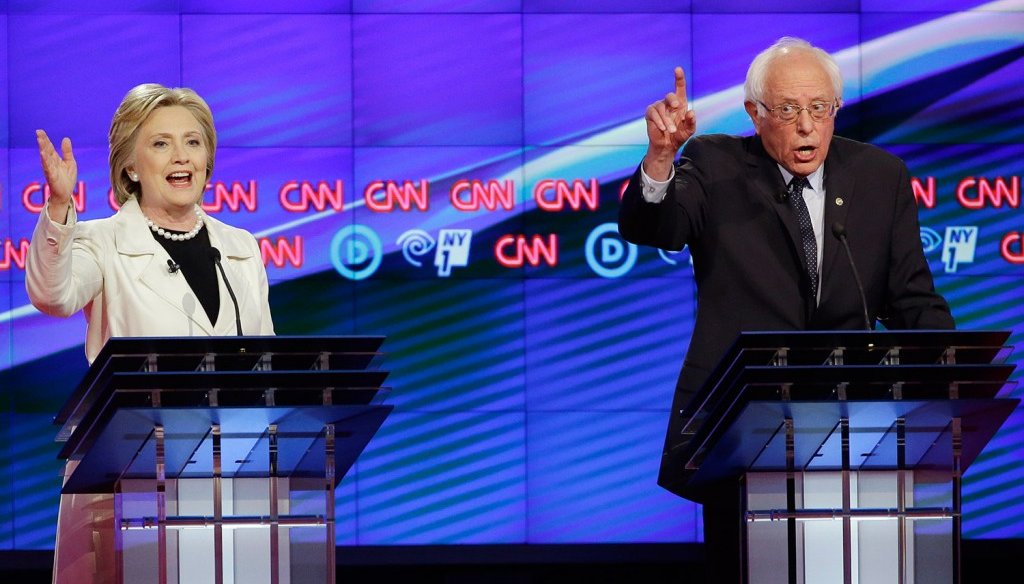Stand up for the facts!
Our only agenda is to publish the truth so you can be an informed participant in democracy.
We need your help.
I would like to contribute

Democratic candidates Bernie Sanders and Hillary Clinton debated in Brooklyn, N.Y., April 14. (Associated Press)
The Democratic primary has really come to a head in the past few weeks. Our five most-popular fact-checks in April were all about former Secretary of State Hillary Clinton, the frontrunner, and her opponent Sen. Bernie Sanders of Vermont.
Bernie Sanders said a Wall Street tax would pay for his free tuition plan.
One proposal boosting Sanders’ support among college-aged voters is his promise of free tuition at public colleges and universities. "I think the idea is sound.It is paid for, Erin, by a tax on Wall Street's speculation," he said to CNN reporter Erin Burnett.
Sanders estimates that his plan to make undergraduate tuition at public colleges and universities free would cost about $75 billion annually. The federal government would fund two-thirds of that cost using a tax on Wall Street trading, but participating states would have to kick in the remaining costs. That’s a big caveat because it leaves some skeptics wondering: What if state governments don’t want to play ball and refuse to kick in the remaining one-third of program costs?
Because Sanders omitted the significant state contribution, and it’s not a sure thing that every state would join in, we rated this claim Mostly False.
Bernie Sanders said poor people don't vote.
"Well, because poor people don’t vote. I mean, that’s just a fact," Sanders said, when asked why he thought Clinton won 16 of 17 states with large wealth gaps. "In America today, the last election in 2014, 80 percent of poor people did not vote."
The data shows that we’ve done slightly better at getting out the vote among low-income people than what Sanders suggests, but not by much. In 2014, about 75 percent of people who made under $10,000 and about 69 percent of those who made under $30,000 didn’t vote. If we look at financial insecurity, however, Sanders is right on the money. A Pew survey found that just 20 percent of the least financially secure were "likely voters" in 2014 compared to 69 percent of the most financially secure.
We rated Sanders’ claim that 80 percent of poor people didn’t vote in 2014 Mostly True.
Bernie Sanders said he's "one of the poorer members of the United States Senate."
Sanders relishes his everyman persona, and during a Democratic presidential debate in Brooklyn, he offered evidence that he’s out of place in the "millionaires’ club" that is Congress. He said, "I remain one of the poorer members of the United States Senate."
We found that Sanders’ net worth does rank him in the bottom one-fifth of the 100-member chamber. Roll Call estimated his minimum net worth to be about $160,000, though the real amount could be higher, and there are many caveats about how useful this measure is. That said, Sanders is largely correct that he’s on the lower end of the chamber’s income scale: The median senator, by Roll Call’s calculation, was $1.1 million, or almost seven times Sanders’ net worth.
With 18 senators with an estimated net worth lower than Sanders’, we rated his claim Mostly True.
Hillary Clinton said Bernie Sanders "has been largely a very reliable supporter of the NRA."
Clinton blasted Sanders over his connections to a target of liberal ire: the gun lobby. "He’s been largely a very reliable supporter of the NRA," she said. "He kept his word to the NRA. He voted against the Brady Bill five times."
She’s right that Sanders voted against background checks and waiting periods, which took place from 1991 to 1993. But her attack that Sanders has consistently supported the gun lobby is a lot less accurate. Sanders has a mixed record when it comes to bills on guns and has earned failing grades from the National Rifle Association for the past two decades. His highest mark was a C- in 2006, a barely passing grade that doesn’t amount to full-throated support.
Neither the gun lobby nor gun control advocates claim Sanders as their own. We rated Clinton’s claim Mostly False.
Hillary Clinton made an absurd claim that she's the only candidate being attacked by Wall Street.
As Sanders continues to hit her over her Wall Street ties, Clinton has tried to show that she and the financial sector are more enemies than friends. "I'm the only candidate in the Democratic primary, or actually on either side, who Wall Street financiers and hedge fund managers are actually running ads against," she said on Meet the Press April 3.
Wall Street financiers and hedge fund managers are running ads against Clinton. But to say she’s the only one being attacked by people associated with the financial sector is preposterous. The financial sector has contributed to both sides of the aisles, including to Clinton’s own campaign. Groups backed by Wall Street have run attack ads against virtually every candidate.
While Clinton has been the target of more attack ads than Sanders, more money from the financial industry has been spent hitting each of the remaining Republicans. In fact, the candidate subject to the most Wall Street-funded hits is actually Donald Trump. We rated Clinton’s claim Pants on Fire.
Our Sources
See individual fact-checks for sources.












































